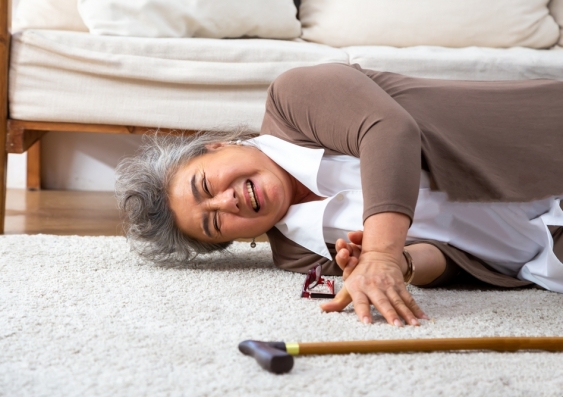New WHO report to bolster global action to prevent shocking rates of falls
UNSW researchers say implementation of new fall prevention strategies will have real impact on lives
UNSW researchers say implementation of new fall prevention strategies will have real impact on lives

Researchers from the George Institute for Global Health and UNSW Medicine & Health’s School of Population Health say recommendations in a new technical report from the World Health Organisation (WHO)-– released this week – will reduce suffering and loss that result from falls. The report, called Step safely: Strategies for preventing and managing falls across the life-course, urges governments, health professionals and practitioners to take urgent action to implement the recommendations.
Professor Rebecca Ivers, Head of the UNSW School of Population Health and Founding Director of the WHO Collaborating Centre (CC) for Injury Prevention and Trauma Care, was an executive editor of Step safely and co-authored the evidence synthesis that informed the report. She said falls prevention couldn’t be tackled as a one-off health issue or in silos, instead requiring a life-course approach.
The report was developed in response to the need for evidence-based strategies to prevent and manage falls and will assist practitioners, program managers and decision-makers whose portfolios may affect falls outcomes.
Falls are a growing and under-recognised public health issue. Every year, more than 684,000 people die as a result of a fall, and 172 million more are left with short- or long-term disability. The vast majority of these deaths occur in low- and middle-income countries. Falls are the second leading cause of unintentional injury deaths worldwide, second only to road traffic injury.
According to the report, most falls can be prevented with appropriate action and there is an emerging body of evidence for effective and promising fall-prevention interventions.
Although further research is required – particularly in low- and middle-income countries – the report provides a summary of the available evidence for three key, at-risk population groups: children and adolescents, workers, and older people.
The report also highlights key emerging principles (such as encouraging and enabling life-long physical activity, reducing environmental hazards, and enforcing policies that encourage cultures and environments of safety) that echo across populations, across the life-course, and across a wide range of settings – and notes that better-organized trauma and health care systems decrease preventable deaths and improve functional outcomes among survivors of serious falls.
“Whether you are a child or an older person, no matter where you live, you have a right to the best chance of not being injured and having a healthy life. Step safely outlines an evidence-based path to this approach,” said Professor Ivers.
Dr Margie Peden, Head of the Global Injury Program at The George Institute for Global Health, and Co-Director of the WHO CC for Injury Prevention and Trauma Care said to work towards the United Nations Sustainable Development Goals (SDGs) to improve health and reduce health inequity, evidence-based global action was required to reduce the growing harm that results from falls.
“The WHO Step safely package is a ‘step’ in the right direction but needs to be supported by multi-country implementation studies to better understand context-specific priorities and which of the recommendations will have the greatest impact.”
Melanie Andersen, who is co-executive editor of Step safely and a Research Fellow at UNSW School of Population Health, said the burden of falls was not equitably distributed.
“Step safely is based on research evidence, though research is scant about preventing falls in some groups like those working in high-risk occupations. Where this is the case, Step safely also takes a pragmatic approach to recommend best practice approaches.”
During the launch event, expert panel member Dr Olive Kobusingye, Senior Research Fellow, Makerere University School of Public Health, Uganda and Distinguished Fellow, The George Institute for Global Health, said: “The lack of organised emergency medical service systems to respond to falls, and of rehab systems in both rural and urban settings, means that patients that suffer falls tend to slip through the cracks - we need to do more sensitisation within the healthcare system and communities so people that suffer falls can get the appropriate care. This includes implementing policies, laws and regulations to prevent falls – especially for safer urban housing and safer workplaces.”
The Evidence Synthesis report, along with a global end-user survey and extensive input from global falls experts, formed the background to Step safely: strategies for preventing and managing falls across the life-course, to which the UNSW researchers were also major contributors.
The George Institute for Global Health is a designated WHO Collaborating Centre for Injury Prevention and Trauma Care
The full report can be viewed here: Step safely: strategies for preventing and managing falls across the life-course
Find more information and the Evidence Synthesis here.
Additional contributors from The George Institute include Dr Jane Elkington, Associate Professor Julie Brown, Dr Soumyadeep Bhaumik, and Caroline Lukaszyk; and from UNSW School of Population Health, Madeline Powell, Professor Lisa Keay and Tracy Ma.